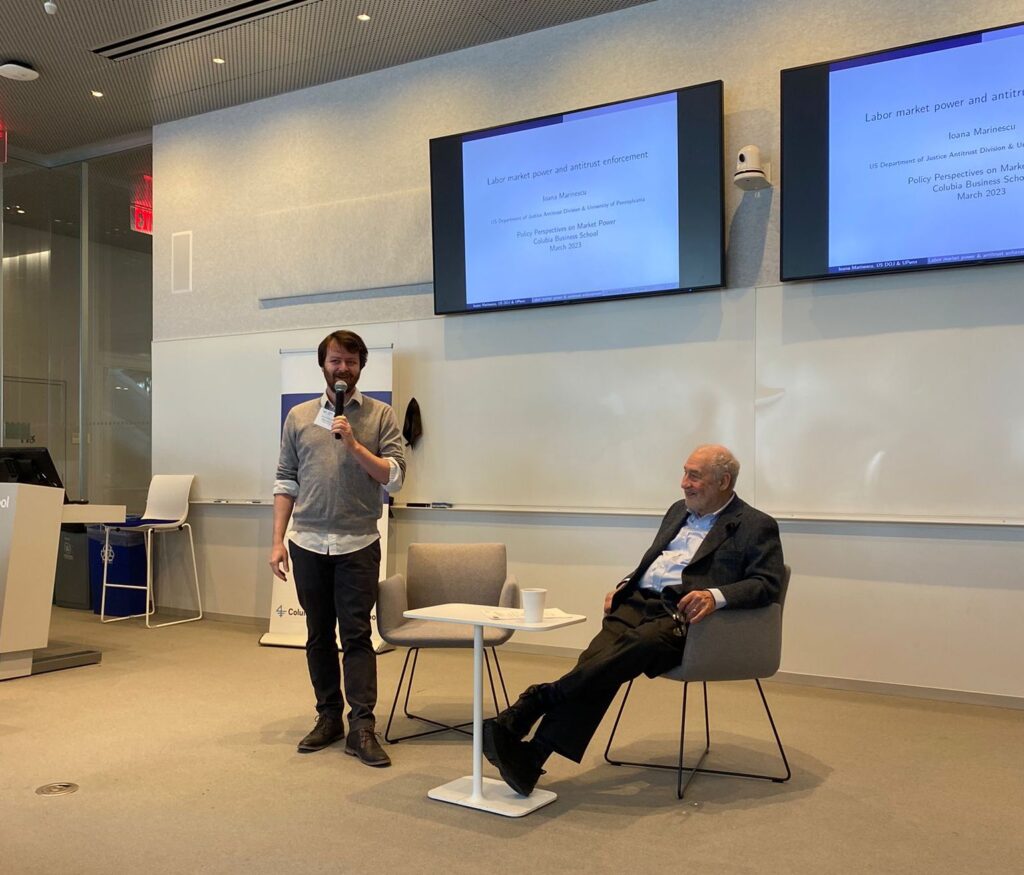
IMPA’s “Policy Perspectives on Market Power” was a small, high-powered conference that featured research presentations and wide-ranging discussions on the most crucial implications of market power for policymaking. The event aimed to provide a forum for leading policymakers and academics to present and discuss the causes and consequences of market power, focusing on the outcomes for fiscal, monetary and competition policy. The conference was held on Friday, March 3rd, 2023, at Columbia University, New York City, NY.
The conference was held in collaboration with The Initiative for Policy Dialogue (IPD) and Columbia Business School.
Getting the Models Right
Opening the conference, Prof. Joseph E. Stiglitz emphasized the crucial importance of macroeconomic models for policy making, since these models play a key role in determining which policies get blessed by institutions such as the Congressional Budget Office (CBO). However, these models often make problematic assumptions – such as assuming markets are perfectly competitive – which do not reflect the flaws of markets in the real world. For example, labor market imperfections, such as monopsony power, have a significant impact on how firms behave and how shifts in aggregate demand get transmitted to employment and wages. Yet such imperfections are not fully incorporated into models.
Getting the models right with respect to market power is therefore critical, Prof. Stiglitz said, because the implications of market power for monetary and fiscal policy were enormous. The key message for researchers and practitioners was that market power needs to be taken into account when thinking about what monetary policy ought to be in the current inflationary episode. Models that move away from the competitive equilibrium assumption have a different set of policy implications. The need of the hour, he noted, was a theory of endogenous change in markups and how policy affects them.
Research Presentations
The event consisted of three sessions, each with two presentations, complemented by discussions. There were three key takeaways:
- Market power makes a difference in the conduct of policy (whether monetary, fiscal or competition policy);
- More research is needed into the causes of market power;
- Old ideas and ways of thinking about policy need to be revisited in light of the new economic realities shaped by market power.
Session 1: Policy Aspects of Market Power
Labor Market Power and Antitrust Enforcement, by Ioana Marinescu (University of Pennsylvania and US Department of Justice, DoJ)
- Based on joint work with José Azar and Steven Berry, 2022: “Estimating Labor Market Power”
Data and Market Power, by Laura Veldkamp (Columbia University)
- Based on joint work with Jan Eeckhout, 2022: “Data and Market Power”
Session 2: Market Power and Taxation
Aggregate and Distributional Consequences of Corporate Taxation, by Juan Montecino (American University)
- Based on joint work with Lídia Brun and Ignacio González, “Corporate Taxation and Market Power Wealth”
Markups and Inequality, by Corina Boar (New York University)
- Based on joint work with Virgiliu Midrigan, 2019: “Markups and Inequality”
Session 3: Monetary Policy and Market Power
Market Power and Monetary Policy Transmission, by Davide Furceri (International Monetary Fund)
- Based on joint work with Romain Duval, Raphael Lee and Marina M. Tavares, 2021. “Market Power and Monetary Policy Transmission”
Monetary Policy under Labor Market Power, by Anastasia Burya (Columbia University)
- Based on joint work with Rui C. Mano, Yannick Timmer and Anke Weber, 2022. “Monetary Policy under Labor Market Power”.


